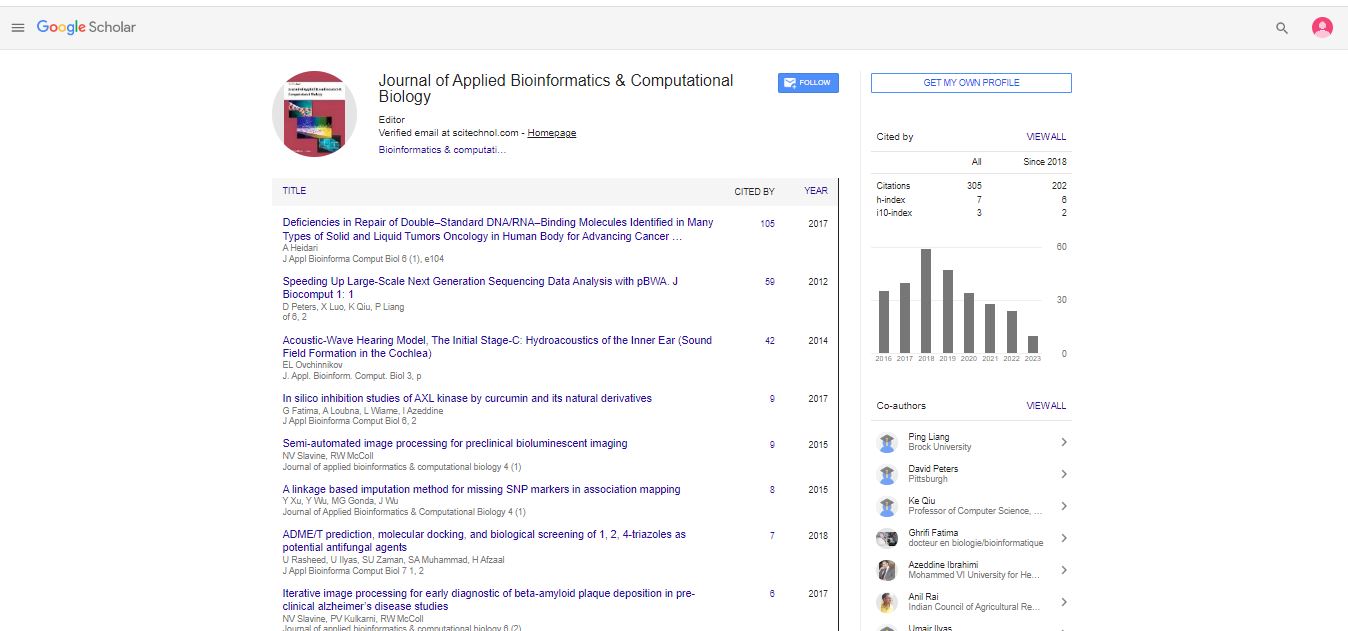Perspective, Vol: 12 Issue: 3
Genomics and Proteomics: Pioneering the Future of Medicine
Abdulaziz Saeideh*
1Department of Biochemistry, Karnataka University, Pavate Nagar, Dharwad, Karnataka, India
*Corresponding Author: Abdulaziz Saeideh,
Department of Biochemistry, Karnataka University, Pavate Nagar, Dharwad, Karnataka, India
E-mail:Saeideh2429@gmail.com
Received date: 27 May, 2023, Manuscript No. JABCB-23-107659;
Editor assigned date: 29 May, 2023, Pre QC No. JABCB-23-107659 (PQ);
Reviewed date: 15 June, 2023, QC No. JABCB-23-107659;
Revised date: 23 June, 2023, Manuscript No. JABCB-23-107659(R);
Published date: 30 June, 2023, DOI: 10.4172/2327-4360.1000271
Citation: Saeideh A (2023) Genomics and Proteomics: Pioneering the Future of Medicine . J Appl Bioinforma Comput Biol 12:3.
Abstract
Description
In the fast-paced world of scientific advancements, genomics and proteomics have emerged as two fields at the forefront of cutting-edge research. These disciplines delve into the study of genes and proteins, unraveling the mysteries of life and opening up a world of possibilities in medicine, agriculture, biotechnology, and more. This article explores the fascinating realms of genomics and proteomics, their significance, and their immense potential to revolutionize various aspects of our lives.
Genomics is the study of an organism's complete set of Deoxyribo Nucleic Acid (DNA), also known as its genome. It encompasses a wide range of research areas, from understanding the basic structure of genes to deciphering complex genetic interactions. The Human Genome Project, completed in 2003, was a landmark achievement that laid the foundation for modern genomics, with advancements in sequencing technology, the cost of genome sequencing has dramatically decreased, making it accessible to researchers and even individuals. This revolution has enabled personalized medicine, where treatments can be tailored to an individual's genetic makeup, leading to more effective and targeted therapies.
Genomics has played a crucial role in identifying the genetic basis of numerous diseases, from rare genetic disorders to common complex conditions like diabetes and cancer. Armed with this knowledge, scientists can develop new diagnostic tools and therapeutic interventions, moving us closer to a future where diseases can be prevented or cured. The ability to manipulate genes raises ethical concerns. Issues such as privacy, genetic discrimination, and germline editing pose significant challenges that require thoughtful consideration and regulation to ensure responsible and equitable use of genomic information.
Proteomics is the study of the entire set of proteins produced by an organism, tissue, or cell. Proteins are the workhorses of life, carrying out essential functions and interactions within living systems.
Analyzing the proteome provides insights into cellular processes, protein structure, and function.
Mass spectrometry and high-throughput technologies have revolutionized proteomic research, allowing scientists to identify and quantify thousands of proteins simultaneously. These techniques have accelerated our understanding of cellular pathways and the dynamic changes that occur in response to different stimuli.
Proteomics has opened up new avenues for drug discovery, as it enables researchers to identify potential drug targets and understand how drugs interact with their respective targets at a molecular level. This knowledge facilitates the development of more effective and specific medications, minimizing side effects and enhancing patient outcomes.
Beyond medicine, proteomics plays a crucial role in agriculture and biotechnology. Understanding the proteomes of crops and livestock can lead to improved yields, disease resistance, and nutritional content, contributing to global food security. Moreover, proteomics is vital in the development of bioengineered products and industrial enzymes.
Systems biology combines genomics and proteomics with computational modeling to understand biological systems. By studying how genes and proteins interact in complex networks, systems biology can provide a comprehensive understanding of biological processes.
Integrating genomics and proteomics through systems biology is a key strategy in precision medicine. This approach aims to tailor medical treatments to individual patients based on their unique genetic and proteomic profiles, improving therapeutic outcomes and reducing adverse reactions.
Complex diseases often involve intricate interactions between multiple genes and proteins. Systems biology approaches are essential in deciphering these complex networks, shedding light on the underlying mechanisms of diseases like Alzheimer's, cardiovascular diseases, and autoimmune disorders. The massive amounts of data generated by genomics and proteomics require advanced computational methods for analysis. The field of computational biology has emerged to develop algorithms and tools to mine, interpret, and derive meaningful insights from these data. The integration of other "o mics" technologies, such as transcriptomics and metaboloics, adds another layer of complexity to biological research. Multi-omics approaches offer a comprehensive view of biological systems, providing a deeper understanding of their intricacies.
The fields of genomics and proteomics have unlocked the door to an exciting era of scientific discovery and innovation. As researchers continue to delve into the intricacies of genes and proteins, we can expect even greater breakthroughs in medicine, agriculture, biotechnology, and more. With responsible use and ethical considerations, genomics and proteomics will pave the way for a healthier, more sustainable future.
 Spanish
Spanish  Chinese
Chinese  Russian
Russian  German
German  French
French  Japanese
Japanese  Portuguese
Portuguese  Hindi
Hindi 
